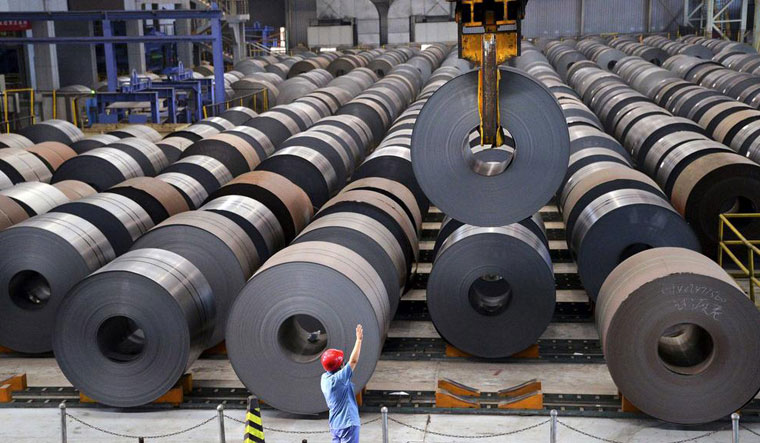In the coming week, India would look to counter charges of leveraging its domestic steel sector, at the G-20's Global Forum on Steel Excess Capacity (GFSEC) talks to be held in Paris. India is also likely to register its protest about punitive tariffs imposed by the Donlad Trump administration, on its steel export to the US.
"India is co-chair at the meeting along with Argentina... We would be discussing the issue of US's steel import tariff hike at this meeting and together seek a solution," Birender Singh, Union steel minister told THE WEEK on Friday, at the sidelines of a steel industry event organised by industry chamber ASSOCHAM. The steel minister confirmed that he would attend the meeting in Paris later this month.
The GFSEC was set up with 33 steel producing nations, with the aim to streamline government policies and reduce anti-competitiveness in steel trade. The G-20 body was formed with the aim to reduce pollution, distress to labours and to promote free trade in steel.
In its last ministerial meeting of the GFSEC, China, India, Indonesia and South Africa said that they have state-owned steel manufacturing capacities, but offer a level playing field in steel policies to both public and private steel producers.
Singh said that India had already justified its steel capacity additions and told the forum that emerging economies need to add capacity in order to reach their development goals. All four nations claimed to not support measures that subsidise production or trade of steel, which in turn is cited to distort the global steel market.
India, in particular, cited that its steel sector remains decontrolled for many years now and that the government envisages capacity addition according to the five-fold increase in steel demand, as envisaged in its National Steel Policy of 2017, Singh said.
The US had expressed little satisfaction with the proceedings of the GFSEC. The USTR's (US trade representative) office noted that the GFSEC has not made any meaningful progress yet on the root causes of steel excess capacity and that 'worn out promises will not cure the fundamental causes of the problem'.
"The United States remains fully engaged in working with Forum members for strong actions to address the root causes of the global steel excess capacity crisis. At the same time, the United States will not hesitate to use the tools available under legal authorities to firmly respond to the causes and consequences of steel excess capacity," the USTR stated after the last GFSEC meeting in Berlin, November 2017.
The Trump administration had earlier this year hiked import duty on Indian steel and aluminum. India's steel producers had a major market as suppliers to the US defence and automobile industry for last one decade.
The regime of lower duty on steel imports from India and other steel producing nations adopted by former US president Barak Obama was reversed by Donald Trump earlier in July this year.
Though some countries like South Korea were later provided with an exemption from tariffs hikes on steel exports, countries like China and India had to approach the World Trade Organisation (WTO) and other multilateral agencies in order to protect the interest of their steel producers.



